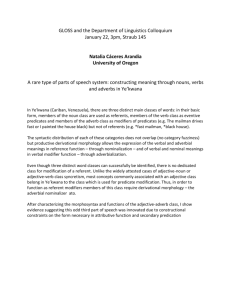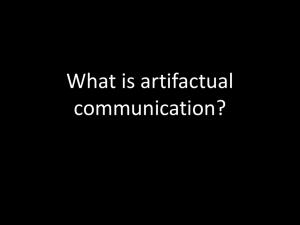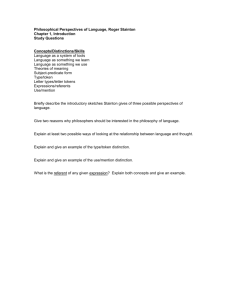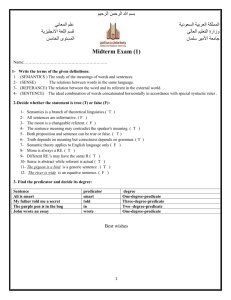Meaning and Privacy
advertisement
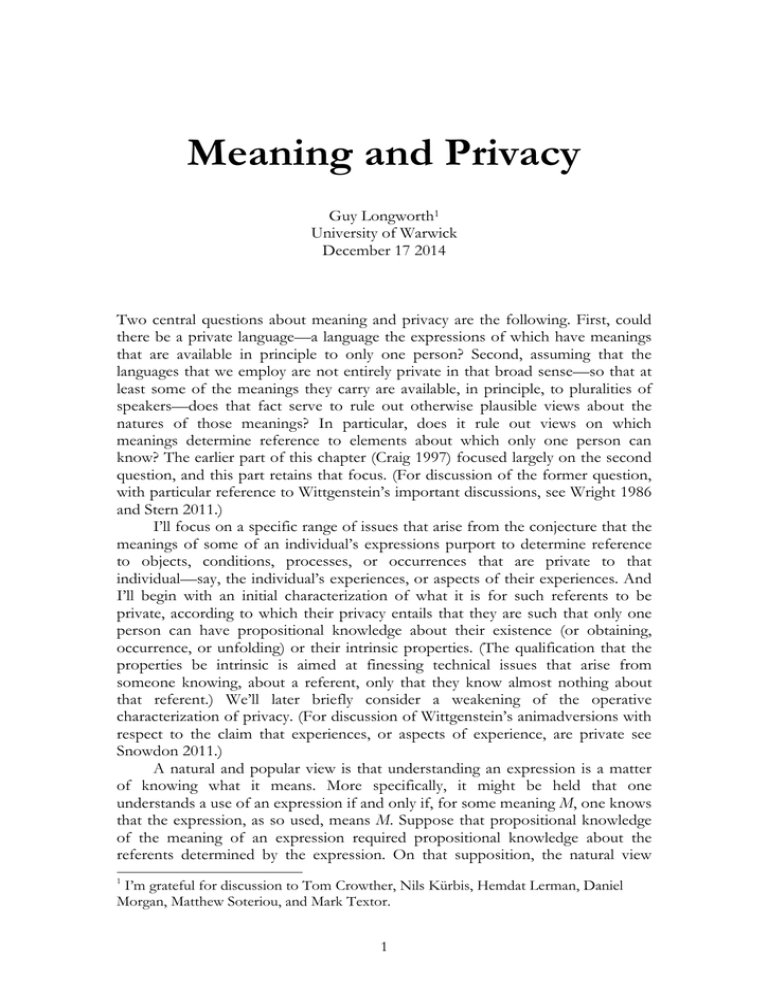
Meaning and Privacy Guy Longworth1 University of Warwick December 17 2014 Two central questions about meaning and privacy are the following. First, could there be a private language—a language the expressions of which have meanings that are available in principle to only one person? Second, assuming that the languages that we employ are not entirely private in that broad sense—so that at least some of the meanings they carry are available, in principle, to pluralities of speakers—does that fact serve to rule out otherwise plausible views about the natures of those meanings? In particular, does it rule out views on which meanings determine reference to elements about which only one person can know? The earlier part of this chapter (Craig 1997) focused largely on the second question, and this part retains that focus. (For discussion of the former question, with particular reference to Wittgenstein’s important discussions, see Wright 1986 and Stern 2011.) I’ll focus on a specific range of issues that arise from the conjecture that the meanings of some of an individual’s expressions purport to determine reference to objects, conditions, processes, or occurrences that are private to that individual—say, the individual’s experiences, or aspects of their experiences. And I’ll begin with an initial characterization of what it is for such referents to be private, according to which their privacy entails that they are such that only one person can have propositional knowledge about their existence (or obtaining, occurrence, or unfolding) or their intrinsic properties. (The qualification that the properties be intrinsic is aimed at finessing technical issues that arise from someone knowing, about a referent, only that they know almost nothing about that referent.) We’ll later briefly consider a weakening of the operative characterization of privacy. (For discussion of Wittgenstein’s animadversions with respect to the claim that experiences, or aspects of experience, are private see Snowdon 2011.) A natural and popular view is that understanding an expression is a matter of knowing what it means. More specifically, it might be held that one understands a use of an expression if and only if, for some meaning M, one knows that the expression, as so used, means M. Suppose that propositional knowledge of the meaning of an expression required propositional knowledge about the referents determined by the expression. On that supposition, the natural view 1 I’m grateful for discussion to Tom Crowther, Nils Kürbis, Hemdat Lerman, Daniel Morgan, Matthew Soteriou, and Mark Textor. 1 about understanding would deliver a straightforward argument from the privacy of referents to the impossibility of more than one person understanding an expression the meaning of which determined those referents. However, there are apparently reasonable grounds for scepticism about the natural view of understanding. The right-to-left conditional can reasonably be challenged on the grounds, first, that one might come to know that an expression means M by being told what it means and, second, that that isn’t per se a way of coming to understand a use of the expression. (That would be compatible with the natural view that knowledge so acquired might put one in a position to go on to understand further uses the expression.) Accordingly, we might deny that knowing that the expression mean M suffices for understanding it. However, that consideration leaves open that understanding is a specific way of knowing, just as seeing that someone is waving is a specific way of knowing that someone is waving. So, it would leave open that knowing that the expression means M is necessary for understanding it. Furthermore, for our purposes, it is the left-to-right conditional that is load bearing. For that direction is what potentially limits the space of acceptable accounts of expression meanings. Is it true, then, that if one understands an expression, there is a meaning M, such that one knows that the expression means M? In the earlier part of the chapter, the claim was challenged on the grounds that reliably true belief about what expressions mean—perhaps as supported by further reliably true belief that the beliefs about meaning are reliably true—might suffice for understanding those expressions. (See the discussion there of what Craig calls Burke’s Assumption. (Craig 1997: 130–5, 142–3)) Additional grounds for doubt may be provided by reflection on cases in which a speaker appears to understand the use of an expression and yet not to meet plausible conditions on knowing what it means. For instance, it’s a plausible necessary condition on knowing what an expression means that one has relevant beliefs about what it means—for example, that where one knows that the expression means M, one believes that it means M. However, consider a case in which you believe that you are in the control of an evil super scientist who has made it so that all of your present experience is hallucinatory. Because of your belief about your circumstances, you withhold belief in how things appear experientially to you. Thus, for example, when you have an experience of a person talking to you, you take it to be the upshot of a hallucination and so do not form the belief that there is someone talking to you. And when you have an experience of the person saying to you that it’s a nice day you fail to form the belief that the person has said to you that it’s a nice day. So, you don’t believe that the person said to you that it’s a nice day. On the assumption that it’s impossible for one to know that they said that it’s a nice day if one doesn’t believe that they said that it’s a nice day, this would be a circumstance in which you don’t know that they said that it’s a nice day. Despite that, it’s plausible that—since the person did in fact say that, and you were aware of their doing so—you understood what they said. So, there are plausible grounds for allowing that it’s possible to understand what someone said—or to know what, on that occasion, they meant—without knowing what they said. (See Hunter 1998, Longworth 2008.) 2 Another way of generating such doubts would be the following. It’s a plausible condition on knowing that such-and-such that, in believing as one does, one couldn’t too easily have been wrong. Thus, if, in sufficiently similar circumstances, one would have formed a similar belief, in a sufficiently similar way, and yet that belief would have been false, then it’s plausible that, in the actual case, one doesn’t know. One wouldn’t know because one’s true belief could too easily have been false. Given that plausible condition on knowing, grounds for doubt about the claim that if one understands, then one knows, would be provided by plausible cases in which one understood an expression by believing it to mean what it in fact means, and yet one’s belief could too easily have been false. Consider the following case. Imagine that you have acquired competence in English via a normal route. Normally, we can imagine, you are in a position to understand what people are saying to you in English and, moreover, to know what they are saying to you. However, your present circumstances are not normal. You are presently under the control of an evil super scientist, so that the vast majority of your present experiences are hallucinatory. Although the contents of your hallucinatory experiences are prosaic, their natures are such that most of the beliefs that you form naturally on their basis will be false. However, for a few moments each day the scientist relinquishes control of your experience, in such a way that the transition between hallucinatory and genuine experience is not noticeable. During one of these periods, the scientist speaks to you in English, saying to you that it’s a nice day. Plausibly, during your brief respite from hallucinations, it is possible for you to see and hear the scientist speaking to you. That is so, despite the fact that it is plausibly impossible for beliefs that you form on the basis of what you see and hear to be knowledgeable, since it would be so easy for you to have so believed and to have been wrong. Furthermore, and of more immediate relevance, it’s plausible that it’s possible for you to understand what the scientist says to you. Again, that seems plausible despite the fact that it’s plausible that you can’t know what the scientist is saying to you since it would be so easy for you to have so believed that he was saying it and to have been wrong. So, it’s plausible that it’s possible to understand what was said in one’s presence even in cases in which it’s not possible to know what was said. (See Pettit 2002, Longworth 2008.) Suppose that that’s right. It would follow that it’s possible to meet necessary conditions on understanding what was said without thereby meeting sufficient conditions on knowing what was said. In that case, even if we were to accept that it is not possible to know what was said—because, for example, that would require knowledge about the referents of what was said, and that is precluded because of their privacy—it wouldn’t follow immediately that it is not possible to understand what was said. For it may be that the reason that knowledge of what was said is precluded is that there is too great danger that one’s beliefs about what was said might be false. Since—by the present supposition—one can understand what was said even in cases in which there is a significant danger of believing falsely, that would present no bar on one’s understanding what was said. I won’t attempt here to decide whether that result is forthcoming or, more generally, how understanding what was said relates to knowing what was said. My aim has been limited to suggesting a way in which those issues might interact with 3 issues about privacy. In summary, whether the impossibility of knowing what an expression is used to mean translates into the impossibility of understanding what the expression is used to mean depends on two factors. First, it depends on which conditions on knowing figure in determining the impossibility of knowing what the expression means. And, second, it depends on whether those conditions are also conditions on understanding what the expression means. Let’s set that issue to one side and turn to a different range of issues that arise if we assume that understanding what is said requires knowing what is said. The initial characterisation of privacy about referents was that a private referent is something such that only one person can have propositional knowledge about its existence or its intrinsic properties. It might seem to follow straightforwardly from that characterisation of privacy that it’s impossible for more than one person to know what someone says about such a private referent. Let’s assume that someone’s saying something about such a referent entails that the referent occurred or that it has one or another intrinsic property. And suppose that a strong closure condition applies to knowing. Specifically, suppose that if one knows that p, and if it being so that p entails it being so that q, then one is in a position to know that q. (Compare here the appeal made in the earlier part of this chapter to the following principle: “if A is an essential constituent of B, the nature of B can be known only if that of A is knowable too.” (Craig 1997: 130)) Given those assumptions, it would be natural to hold that no one other than the speaker could know what the speaker says about their private referents. For suppose that a speaker A says that p and that they are the only person able to know about the existence or the intrinsic properties of a referent determined by the proposition that p. And now assume, for purposes of reductio that a speaker B, distinct from A, comes to know that A said that p. A’s having said that p entails that the referents determined by the proposition that p occurred or that they have one or another intrinsic property. In conjunction with that entailment, the strong closure condition has it that it follows, from B’s knowing that A said that p, that B is in a position to know that the referents occurred or that they have one or another intrinsic property. But by assumption, since at least one such referent is private according to the initial characterization, B is not in a position to know that that referent occurred or that it has one or another intrinsic property. And so, given our assumptions, the supposition that B knows that A said that p entails a contradiction and, so, must be rejected. An obvious problem with that derivation is that it depends upon the correctness of the strong closure condition. For the strong closure condition is obviously too strong, entailing, for example, that if one knows the Peano– Dedekind axioms, one is thereby in a position to know all arithmetical facts. (On the face of it, the same consideration serves also to vitiate Craig’s principle. However, the unexplained notions of constituency and knowledge of natures that are embedded in that principle make the issue hard to assess.) Furthermore, the natural weakening of the closure condition would be too weak to deliver the required conclusion. For the natural weakening would be the following: if one knows that p, and if one knows that it being so that p entails it being so that q, then one is in a position to know that q. And that condition would have as a consequence that it is impossible for B to know that A said that p only if B knew, 4 of the private referents determined by A’s saying that p, that A’s having said that p entails that those private referents occurred or that they had one or another intrinsic property. Not only is there no immediate reason to think that an arbitrary B must have the required knowledge but, in addition, there is reason to think that, because of the privacy of the subject matter of the entailment’s consequent, B can’t have the required knowledge. So, even if the weaker closure condition were acceptable—and to be clear, the weaker condition is, at best, controversial—it would not obviously furnish the required connection between the knowledge of meanings and knowledge of referents determined by those meanings. Perhaps, however, there is an alternative form of closure condition that is more plausible than the strong closure condition and that, in addition, sustains the required consequence. Although it doesn’t appear to be true in general that knowledge is closed under entailment, perhaps it’s true that knowledge is closed under a sub-class of cases of entailment. Suppose that the sub-class could be shown to include all cases in which the entailment relation is underwritten by the connection between someone saying something and the existence or the intrinsic qualities of the referents that are determined by what they say. In that case, closure would apply in the case at issue, connecting knowledge of what A said and knowledge about the private referents determined by what A said. And that would suffice to reinstate the conclusion that B cannot know what A said. Rather than pursue the large and delicate question whether the required form of closure condition is defensible, I propose instead to consider a more local issue. Assume that the required form of local closure condition is correct. We’ve seen that that closure condition, in conjunction with referents that are private according to our initial characterization, entails that at most one person can understand what is said when what is said determines those referents. For according to the initial characterization of a private referent, it is something such that only one person can have propositional knowledge about its existence or intrinsic properties. The difficulty with that as an argument to our target conclusion is that in assuming that initial characterization of privacy, it seems to assume an overly demanding conception of privacy. The initial conception seems overly demanding for the following reason. It is liable to seem natural—at least to proponent of private referents—to hold that there are referents that are available, for instance as objects of knowledge, in a particular way to only one person. For example, a proponent of private referents might hold that there are objects of private experiences that can be known in a peculiarly first-personal way only to their subject. Furthermore, it is arguable that, unlike objects of public experience, such referents can be known at first hand to only one person, the subject of the experience. However, even if such a conception of private referents were defensible, it would not immediately support the claim that such referents are unknowable to anyone other than their subject. In order to support the latter claim, a case would have to be made that such referents are not knowable at second hand, on the basis of understanding and accepting what the subject says about them. The considerations that we’ve discussed to this point seem powerless to sustain such a case. For example, any such case would have to go beyond appeal to the weak closure condition considered above, on which knowledge is closed 5 under known entailment. For the weak closure condition would serve, at most, to impose the requirement that one who understands what is said about a private referent is placed, thereby, in a position to acquire knowledge about that referent. (At most, since, as was noted above, it would deliver that result only with respect to subjects who knew the operative entailments.) And one might meet that condition via understanding what a subject tells one about the referent, even if no non-vicarious route to such knowledge were available to one. For example, one might gain the required epistemic position by reasoning from facts about meaning and facts about what those facts entail. What would be needed, in addition, in order to make the required case would be a defence of the further condition that one must be in a position to know the known entailments of what one knows independently, and in advance, of knowing the entailing facts. Furthermore, our ordinary judgements about cases seem consistent with allowing the possibility of purely second hand knowledge about the things to which an interlocutor refers. For example, it seems possible for you to acquire knowledge about someone with whom you are not acquainted—say, my friend Kim—solely on the basis of my testimony about them. Argument would be required to show that one couldn’t similarly come to know about another’s private referents on the basis of their testimony. Let me summarise the foregoing. I’ve considered the prospects for an argument from the privacy of a referent determined by the meaning of an expression to the impossibility of more than one person understanding a use of the expression. I considered a line of argument based on an initial characterisation of privacy, according to which a private referent is something such that only one person can have propositional knowledge about its existence or intrinsic properties. The argument was, in effect, based upon two assumptions: first, that understanding the meaning of a use of an expression requires knowing the meaning of the expression; second, that knowing the meaning of an expression requires knowing about the referents of the expression. I suggested some grounds for doubting both assumptions. Finally, I suggested that the initial characterisation of privacy might be too demanding. And the adoption of a more reasonable characterisation of privacy would further dim the prospects for a compelling argument from privacy of referents to the impossibility of mutual understanding. References Craig, Edward. 1997. “Meaning and Privacy.” In B. Hale and C. Wright, eds. A Companion to the Philosophy of Language. Oxford: Blackwell. Hunter, David. 1998. “Belief and Understanding.” Philosophy and Phenomenological Research 53, 3: 559–80. Longworth, Guy. 2008. “Linguistic Understanding and Knowledge.” Noûs 42, 1: 50–79. Pettit, Dean. 2002. “Why Knowledge is Unnecessary for Understanding Language.” Mind 111, 3: 519–550. 6 Snowdon, P. 2011. “Private Experience and Sense Data.” In O. Kuusela and M. McGinn eds. The Oxford Handbook of Wittgenstein. Oxford: Oxford University Press. Stern, D. 2011. “Private Language.” In O. Kuusela and M. McGinn eds. The Oxford Handbook of Wittgenstein. Oxford: Oxford University Press. Wright, C. 1986. “Does philosophical investigations I. 258-60 suggest a cogent argument against private language?” In J. McDowell and P. Pettit eds. Subject, Thought, and Context. Oxford: Clarendon Press. 7
